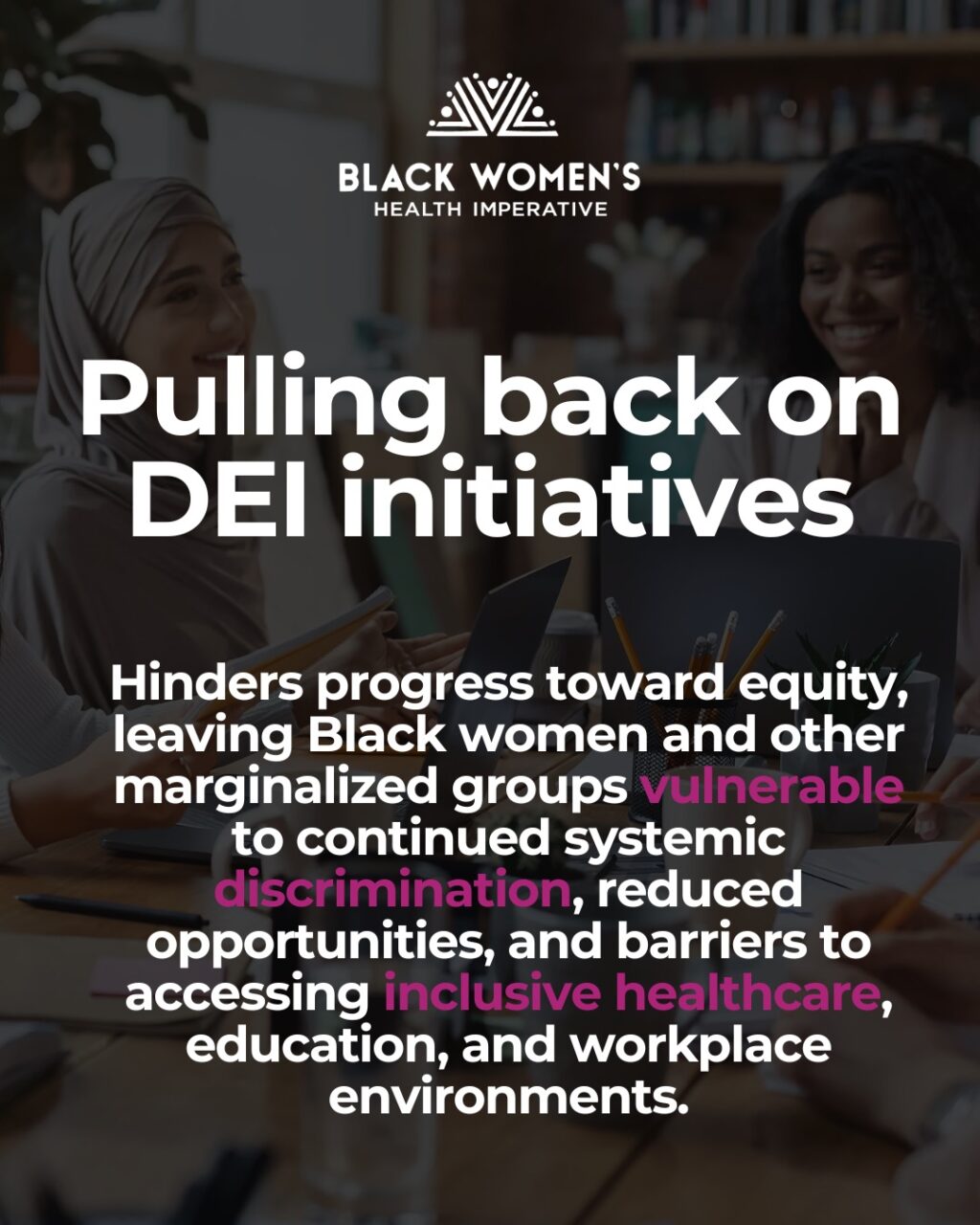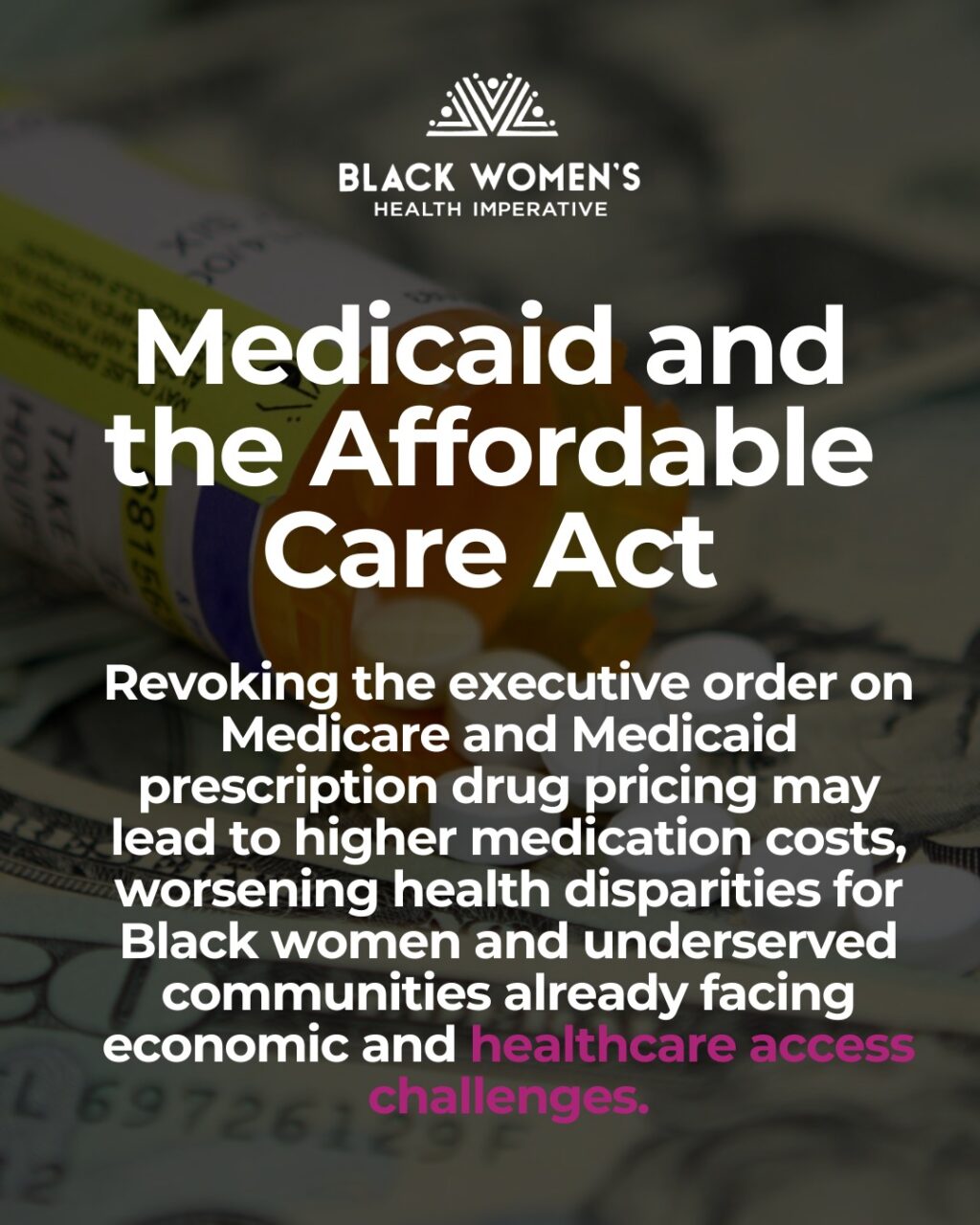Major Healthcare Shifts Ahead: From DEI to Drug Prices, What’s Changing?
As an organization dedicated to the health and wellness of Black women, we feel it’s crucial to address the recent executive orders that could affect our community’s access to healthcare and overall wellbeing.
What’s Changed?
Several executive orders that supported equity and expanded healthcare access have been rescinded. Of particular importance to our community are the reversals of:
- Executive Order 13985 on Advancing Racial Equity and Support for Underserved Communities
- Executive Order 14009 on Strengthening Medicaid and the Affordable Care Act
- Executive Order 14070 on Continuing to Strengthen Americans’ Access to Affordable, Quality Health Coverage
- Executive Order 14087 on Lowering Prescription Drug Costs
- Executive Order 13995 on Ensuring an Equitable Pandemic Response and Recovery

When “Everyone’s Responsible” Means No One Is Accountable
The rollback of DEI initiatives reminds us of an important truth: when we make everyone generally responsible for fairness in healthcare, we often end up with no one specifically accountable for it. Here’s what this looks like in practice:
- Without dedicated DEI offices, addressing healthcare disparities becomes “everyone’s job,” but no one’s priority
- Removing specific equity goals from performance metrics means institutions lose concrete ways to measure progress
- Eliminating dedicated positions means no one is specifically tasked with monitoring and addressing systemic barriers
- Without formal programs, addressing bias in healthcare settings becomes optional rather than required
What’s Changing
- Federal agencies have 60 days to terminate DEI offices and positions
- Review and revision of federal employment practices
- Changes to federal contractor requirements regarding DEI training
- Elimination of equity-related grants and contracts
The connection between DEI programs and healthcare outcomes cannot be overstated. Research consistently shows that diverse healthcare teams lead to better patient outcomes for our community. Cultural competency in healthcare settings has proven crucial for building trust and improving communication between patients and providers. Additionally, representation in medical research is vital for ensuring treatments are effective for all communities, while DEI training has been instrumental in addressing implicit bias in medical settings that can affect quality of care.
These policy changes are particularly concerning given the persistent healthcare disparities in our community. Black women continue to face disproportionately higher maternal mortality rates, and chronic conditions like hypertension and diabetes affect us at higher rates. Access to preventive care remains uneven across racial and ethnic lines, and studies consistently demonstrate that having doctors who look like us leads to better health outcomes.
The Numbers Tell Our Story
Right now, approximately 24 million Americans have health insurance through the Affordable Care Act (ACA). For many Black women, who are often primary caregivers and healthcare decision-makers in our families, these coverage options have been crucial. The recent executive orders could significantly impact this coverage, with some analysts projecting up to a 25% reduction in ACA coverage due to the repeal of Executive Order 14009 alone.
 Breaking Down the Changes
Breaking Down the Changes
Let’s look at what’s specifically at stake:
Healthcare Coverage and Costs
- The repeal of Executive Order 14009 could restrict access to expanded Medicaid benefits, particularly affecting families with young children
- Changes to eligibility requirements and federal subsidies could make insurance less affordable
- The American Rescue Plan Act’s subsidy program, which made premiums more affordable, is set to expire this year
- Potential Medicaid funding cuts to states could limit program access
Maternal Health Concerns
One change that particularly affects our community is the repeal of Executive Order 14070, which had provided states with options to extend postpartum Medicaid coverage. As Black women face disproportionate maternal health risks, this change could have serious implications for new mothers in our community.
Reproductive Health Resources
We must also note that reproductiverights.gov, a vital source of information about reproductive healthcare access, has been taken down. However, you can still access this essential information through organizations like ours and other trusted healthcare advocacy groups. We’re committed to ensuring you have access to comprehensive reproductive health information and resources.
The Ripple Effects
Professor Sabrina Corlette from Georgetown University’s Center on Health Insurance Reforms points out some sobering consequences:
- Higher premiums for those who maintain insurance
- Increased risk of medical debt
- Potential wage garnishment
- Possible property liens due to unpaid medical bills
For our community, which has historically faced barriers to building generational wealth, these financial risks are particularly concerning.
What This Means for Black Women
These policy changes could disproportionately impact Black women in several ways:
- Reduced access to preventive care
- Higher out-of-pocket costs for essential medications
- Limited options for maternal healthcare
- Increased financial strain on families
Taking Action: What You Can Do Now
- Protect Your Current Coverage
- Keep your existing insurance active
- Mark your calendar for renewal dates
- Document any changes in your coverage or costs
- Know Your Rights
- Save documentation of all healthcare interactions
- Keep records of any coverage changes or denials
- Connect with patient advocacy organizations
- Financial Planning
- Review your healthcare budget
- Explore all insurance options, including employer-sponsored plans
- Consider setting aside emergency funds for medical expenses
- Community Resources
- Connect with local health advocacy groups
- Share information within your networks
- Support organizations like ours fighting for healthcare equity
Looking Forward
While these changes are concerning, remember that many healthcare protections remain in place through existing laws. The Black Women’s Health Imperative will continue to:
- Monitor policy changes
- Advocate for equitable healthcare access
- Provide updated information and resources
- Support our community’s health needs
Stay Connected
We’re committed to keeping you informed about these changes and their impacts. Follow us on social media
Instagram – instagram.com/blkwomenshealth
Threads – threads.net/blkwomenshealth
Facebook – facebook.com/blackwomenshealthimperative
Linkedin – linkedin.com/company/black-women’s-health-imperative/
YouTube – youtube.com/blackwomenshealthimperative
Sign up for our newsletter below for regular updates. Remember, your health and wellbeing remain our top priority.

